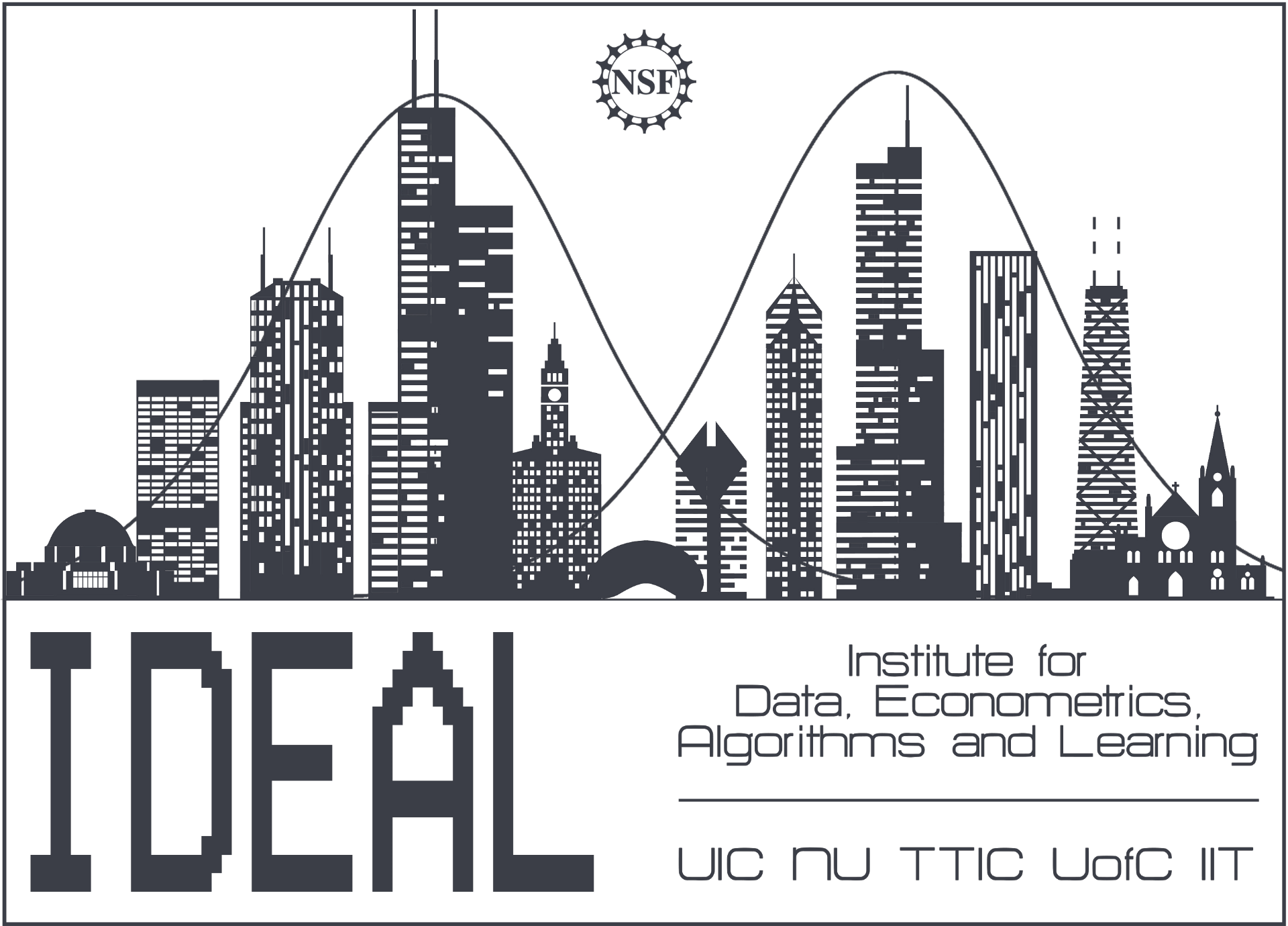Graduate students from UIC, NU, TTIC, UC, and IIT may request to take these courses and receive credit at their home institutions (or to simply audit these courses). Note that credits received for taking these courses might not correspond exactly with the listed course and will be determined in consultation with the IDEAL site director1 of the graduate student’s home institution. Each course will run according to the schedule of the respective university offering the course.
[To facilitate receiving credit at your home institution, please fill the following form.]
University of Illinois at Chicago (UIC):
CS 520 Causal Inference and Learning (in person)
Elena Zheleva Taft Hall 208
TR 11:00 am-12:15 pm
Causal reasoning, structural causal models, interventions and counterfactuals, identification, mediation, attribution, dealing with confounding, selection, and interference bias.
ECE 415 Image Analysis and Computer Vision (online)
Ahmet Enis Cetin [Contact aecyy@uic.edu]
TR 12:30-1:45 pm
Image analysis techniques, 2D and 3D shape representation, segmentation, camera and stereo modeling, motion, generic object and face recognition, parallel and neural architectures for image and visual processing..
ECE 491 Introduction to Digital Speech Processing (in person or online)
Ahmet Enis Cetin Lecture Center A4 [or contact aecyy@uic.edu]
MW 4:30-5:45 pm
Both basic speech coding and recognition are covered in this course. Waveform coders: PCM, DPCM, wavelet and DCT based encoders. Vocoders: Linear predictive coding (LPC-10), Code excited linear prediction (CELP) and MELP. Cepstrum, Mel-cepstrum, Speech recognition using Hidden MarkovModels and deep neural network-based speech recognition.
ECE 508 Convex Optimization (in person)
Shuo Han Lincoln Hall 202
MW 4:30-5:45 pm
This graduate-level course covers three main aspects of convex optimization: theory, applications (e.g., machine learning, signal/image processing, controls), and algorithms. The course will roughly follow the book by Boyd and Vandenberghe.
ECE 534 Elements of Information Theory (in-person)
Natasha Devroye Lincoln Hall 301
TR 11:00 am-12:15 pm
Entropy and mutual information, fundamentals of coding theory, data compression, complexity of sources, channel mutual information and capacity, rate distortion theory, information theory applications.
MCS 549 Mathematical Foundations of Data Science (in person)
Lev Reyzin Burnham Hall 304
MWF 12:00-12:50 pm
This course covers the mathematical foundations of modern data science from a theoretical computer science perspective. Topics will include random graphs, small world phenomena, random walks, Markov chains, streaming algorithms, clustering, graphical models, singular value decomposition, and random projections.
Northwestern University (NU):
CS 496 Foundations of Reliable Machine Learning (in person)
Aravindan Vijayaraghavan TBD [will possibly share recordings]
T 9:30 am-12:00 pm
Today’s data pose unprecedented challenges for machine learning, statistics and data analysis. It may be incomplete, noisy, or exposed to some unknown source of corruption. Moreover, recent phenomenon of (imperceptible) adversarial perturbations have also demonstrated that robustness is important for reliable and secure adoption of ML systems in practice. In this course, we will learn about different theoretical frameworks to model and reason about various kinds of noise, corruptions and errors in machine learning and statistical tasks. We will also learn about different algorithmic techniques that are both efficient and robust, in the context of both supervised and unsupervised learning. Finally, we will also explore new topics like adversarial robustness and relations to topics like differential privacy.
CS 496 Learning in Networks (in-person)
Miklos Racz Tech LG66
MW 11:00 am-12:20 pm
This is a graduate topics course on learning in networks, focusing in particular on fundamental statistical and computational limits. Topics include the planted clique problem, community detection, high-dimensional random geometric graphs, root-finding algorithms, graph matching, information-computation gaps, and more. While exploring these topics, we will discuss several general techniques that are applicable more broadly, such as the first and second moment methods, concentration inequalities, martingales, branching processes, information-theoretic methods, spectral algorithms, and more.
MSAI 448 Law and the Governance of Artificial Intelligence (in-person)
Daniel Linna Padula Room, McCormick Education Center, Evanston
W 12:00-2:50 pm
This course introduces engineers to the legal, regulatory, ethical, and policy questions raised by advancements in artificial intelligence and its increasing use. We will study issues in the use of artificial intelligence in various forms by businesses, governments, and nongovernmental organizations. We will explore the roles of individuals and organizations as well as governments, regulatory bodies, and the broader international community for the successful governance of artificial intelligence. This course also explores the use of artificial intelligence to preserve and promote the rule of law, improve justice, and expand access to law and legal services.
Toyota Technological Institute at Chicago (TTIC):
TBD
Illinois Institute of Technology (IIT):
CS 584 Machine Learning (in person + online sessions)
Binghui Wang IIT Tower 1F6-1
MW 10:00-11:15am
Introduce fundamental problems in machine learning. Provide understanding of techniques, mathematical concepts, and algorithms used in machine learning. Provide understanding of the limitations of various machine learning algorithms and the way to evaluate performance of learning algorithms. Topics include introduction, regression, kernel methods, generative learning, discriminative learning, neural networks, support vector machines, graphical models, unsupervised learning, and dimensionality reduction.
